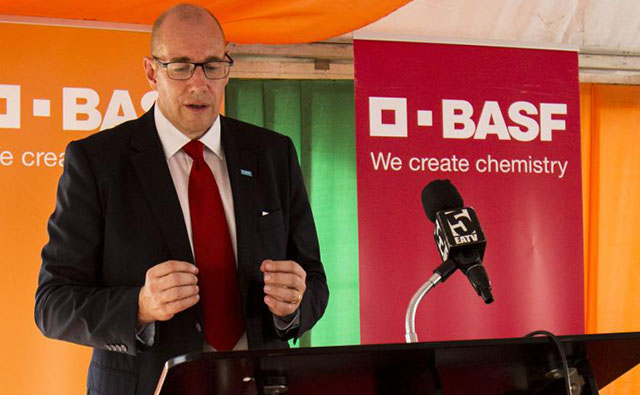Industry News, Agriculture & Feed
Crop Protection in Africa: BASF Investing in Emerging Markets

Industry News, Agriculture & Feed

Image: Mats Idvall, BASF, via Agribusinessglobal.com
BASF is implementing an ambitious strategy in Africa, driven by local presence as it pursues growth in the continent.
In the recent past BASF has opened offices in different African countries, invested in production plants, launched new business models, and even rejiggered management structures as part of strategies to pursue growth in a continent that it believes offers huge potentials.
The latest moves have been the opening of a new office in Tanzania, a development that came just a few months after BASF commissioned a production plant in the country.
Apart from Tanzania, BASF has also opened offices in Zambia and Ivory Coast and also has a local presence in Ethiopia and Kenya.
Until recently the company that began doing business in Africa about 90 years ago — focusing on the key industries of construction, textiles, automotive, agriculture, plastics, and healthcare — had largely relied on local partners.
“At BASF we have a strong belief in local presence. Our investment in Tanzania is a clear signal that BASF is taking the East African region as a potential growth area,” Mats Idvall, BASF Tanzania’s Managing Director, says.
He adds that BASF’s growth strategy in Africa will succeed through investment in local production and use of locally available resources to ensure sustainable growth.
For BASF the decision to pursue a local presence strategy as opposed to regional clusters is strategic. With a portfolio that ranges from chemicals, plastics, performance products, and crop protection solutions to oil and gas, the company believes local presence will enable it to reach more customers.
Although Africa’s influence in the company’s overall performance is rather small, the continent forms an important component in its emerging market growth strategy, taking into account that emerging markets are expected to account for around 65% of global chemical production by 2025.
“We aim to benefit from the above-average growth in these regions, which is why we have invested more than a quarter of our capital expenditures there in the past five years,” the company stated in its 2017 financial report.
Considering that most African countries have put in place policies to accelerate growth of key sectors, such as agriculture, manufacturing, building, and construction, while in some countries oil, gas, and mining are emerging as a critical sector, BASF is investing in increasing its presence on the continent to serve its customers more efficiently and effectively.
In Tanzania, BASF is already active in the agrichemicals and construction chemicals divisions. In the construction chemicals division it operates admixtures for a concrete plant, which is run through a tolling agreement with a local partner. The company intends to explore opportunities in areas like mining, industrial, and domestic cleaning, food fortification, insulation, human and animal nutrition, and fuel and lubricants.
“The opening of an office in Tanzania is a clear signal that BASF understands that, to have long-term success, there is need for collaboration with Tanzanians,” Idvall says.
One area that BASF will be seeking to deepen collaboration is in agriculture, one of the strongest pillars of Tanzania’s economy.
Currently, the company is engaged in the supply of agrichemicals products for farmers in the maize, cereals, soybean, rice, bean, and coffee sub-sectors through appointed distributors.
In order to reach more farmers, BASF works with non-governmental organizations like Nafaka through their agro-dealer programs and also trains farmers on the safe use of pesticides.
For instance, the company has participated in the spray service provider programs in which trained sprayer teams are engaged by farmers to do farm spraying on behalf of small holder farmers.
Through these initiatives, that company wants to push growth of its crop protection solutions in a country where use of agrichemicals by farmers is among the lowest.
Although the agricultural sector in Tanzania accounts for about 30% of the gross domestic product, the majority of small-scale farmers are stuck in organic farming, which has limited the potential of the sector, which accounts for about 80% of export revenue.
This is evident considering that in 2016 Tanzania tallied $640 million from horticulture exports compared to $990 million that Kenya generated.
“BASF will continue to work with the various governments and industry stakeholders to enable us to respond to industry challenges,” Idvall says.
He adds the company believes in partnerships that will help meet local demand and make customers more successful while it grows its business. This will be achieved by replicating the Kenyan model launched in January in which BASF targeted more farmers with the opening of a new warehouse in Nairobi and the appointment of more distributors.
The model, dubbed “Angaza,” which means “to light up” in Swahili, ensures that farmers have access to sustainable solutions for optimum yields as it enables BASF to expand its reach to even more small holder farmers and respond effectively to market demands at various touch points.